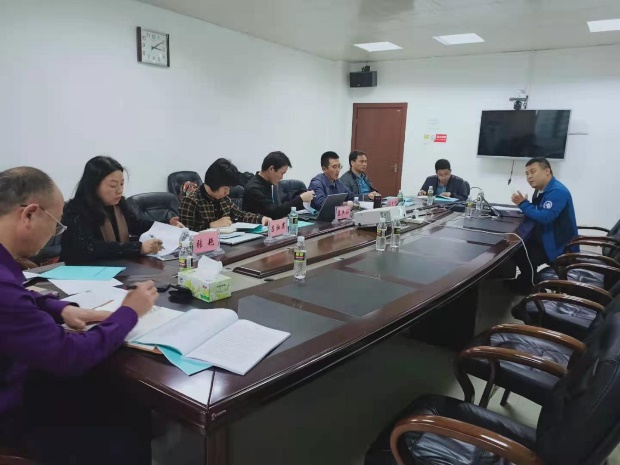The research project on the development of carbon sink in Hainan Province passes the expert review
2020年12月9日,海南省生态环境厅在海口组织海南省海洋生态系统碳汇发展路线图研究项目结题评审会。海南省生态环境厅海洋环境管理处副处长万年生、应对气候变化与科技财务处副处长滕文亮,以及自然资源部第三海洋研究所、海南省环境科学研究院、琼台师范学院、北京中创碳投有限公司等单位的专家出席了评审会。
On December 9, 2020, the Department of Ecology and Environment of Hainan Province (DEE) organized a final evaluation meeting for the research project on the development of carbon sink in marine ecosystem of Hainan Province in Haikou. The attendees included: Niansheng Wan, Deputy Director of Marine Environment Management Department of DEE; Wenliang Teng, Deputy Director of Climate Change Response and Science and Technology Finance Department of DEE; experts from the Third Institute of Oceanography of Ministry of Natural Resources, Hainan Province Environmental Science Study Institute, Qiongtai Normal University and SinoCarbon Innovation & Investment Co., Ltd.
项目负责人、海南大学南海海洋资源利用国家重点实验室高树基课题组赵鹏副研究员在分析国内外蓝碳科学和政策进展、我国海岸带蓝碳现状与政策、海南海岸带蓝碳现状与政策、碳市场、蓝碳标准体系的基础上,从蓝碳调查与监测、基础研究与标准、保护与修复、交易机制与项目开发、产业发展、以及国内和国际合作等方面提出了路线图的内容和时间安排。
Based on the analysis of the progress of blue carbon science and policy at home and abroad, the current situation and policy of blue carbon in coastal zones of China and Hainan, the carbon market, and the blue carbon standard system, Peng Zhao, the principal investigator of the project and associate research professor of State Key Laboratory of Marine Resources Utilization in South China Sea (MRU), proposed the content and schedule of blue carbon in terms of investigation and monitoring, basic research and standard, protection and restoration, trading mechanism and project development, industrial development, and domestic and international cooperation.

与会专家认真审阅了项目成果,进行了热烈讨论,充分肯定了项目成果,认为项目面向《国家生态文明示范区(海南)实施方案》关于“开展海洋生态系统碳汇试点”任务部署,系统全面地梳理了国内外蓝碳科学、政策和碳市场进展,研究成果创新性强,政策建议具有针对性,为主管部门制定蓝碳政策提供了支撑和依据,一致同意该项目通过评审。
The experts at the meeting reviewed and fully affirmed the achievements of the project, thinking that the project catered to the Implementation Plan for the National Ecological Civilization Pilot Zone (Hainan) on the task of “carrying out pilot projects on carbon sinks in marine ecosystems”. Specifically, the project had systematically and comprehensively reviewed the progress of blue carbon science, policy and carbon market at home and abroad, and the research achievements were highly innovative and the policy recommendations were clear, which provided support for the competent departments to formulate blue carbon policies.
2020年9月,习近平主席在第七十五届联合国大会一般性辩论上表示,中国努力争取2060年前实现碳中和。自2009年起,红树林、海草床、滨海盐沼和大型海藻等海岸带蓝碳受到国际社会的广泛重视,并已纳入《联合国气候变化框架公约》及其《巴黎协定》相关机制。蓝碳作为海洋自然过程减缓气候变化的主要途径,是海洋领域支撑我国碳中和目标的重要内容,并在适应气候变化不利影响,保护生物多样性,保障食物供给、促进沿海地区可持续发展方面发挥重要作用。
In September 2020, President Xi Jinping said at the 75th session of the United Nations General Assembly that China strived to achieve carbon neutrality by 2060. Since 2009, the blue carbon in coastal zones, such as mangroves, seagrass beds, coastal salt marshes and macroalgae, had received widespread attention from the international community and had been included in the United Nations Framework Convention on Climate Change and Paris Agreement. As the main way to naturally mitigate climate change in the ocean, blue carbon was important in the marine sector to support China's carbon neutrality, and played an important role in adapting to the adverse effects of climate change, protecting biodiversity, safeguarding food supply and promoting sustainable development in coastal areas.
下一步,项目组将继续积极支撑海南省海洋领域应对气候变化工作,面向我国2060年碳中和目标和海南省委七届九次全会关于“海南要成为在国际上展示我国积极参与应对全球气候变化和生态文明建设成果的亮丽名片”的要求,继续做好国家和海南省蓝碳政策支撑,开展红树林、海草床修复技术和可持续发展模式、国家温室气体清单(滨海湿地)和蓝碳交易研究与实践。
The project team will continue to actively cope with climate change. Facing the target of carbon neutrality by 2060 and the requirement of the 9th Plenary Session of the 7th Hainan Provincial Committee that “Hainan should become a model to show the achievements of China's active participation in addressing global climate change and ecological civilization construction”, the project team will support the blue carbon policies, carry out research and practice on mangrove and seagrass bed restoration technology and sustainable development model, national greenhouse gas inventory (coastal wetlands) and blue carbon trading.
 公众号
公众号